Interested in becoming a Therapy Team?
Interactions with many species of animals can be therapeutic. We register nine different species of animals for therapy visits, including dogs, cats, horses, rabbits, guinea pigs, rats, birds, miniature pigs, llamas and alpacas.
Be at least one year old at the time of evaluation, or six months old for rabbits, guinea pigs, and rats.
Be reliably house-trained, as waste collection devices are not permitted (except for flight suits for birds).
Be currently vaccinated against rabies (rabbits, guinea pigs, rats, and birds are exempt).
Welcome, not merely tolerate, interactions with strangers.
Have no history of aggression or causing serious injury to other people or pets, including bite or protection training.
Have lived in the owner’s home for at least six months (one year for birds). This allows time for a bond to be created between the owner and pet.
Be responsive to their owner’s direction and support.
Not be fed a raw meat diet.
Be comfortable wearing Pet Partners acceptable equipment.
If you have a young animal who does not meet all the above requirements yet, it is never too early to start preparing for future volunteer work!
All Therapy Animals, regardless of type, must:
Steps to Becoming
a Registered Therapy Animal Team
1. Meet the requirements
(See the previous section)
2. Initial screening
Meet with one of our volunteer members to see whether you and your animal would be good candidates to do therapy work.
While this screening is not required to register with Pet Partners, it is a good way to see what skills/training you and your animal need to focus on. This screening is required to become a Tender Paws member and attend meetings with your animal.
FEE: ___FREE___
3. Register with Pet Partners
Go go to the Pet Partners Website at Pet Partners and open a free volunteer account. This will allow you to access courses, training materials, and sign up for tests Just click on the button below.
Fee: ___FREE___
4. Take the Handler's Course
(Online or In-Person)
Take the Therapy Animal Handler's online course with Pet Partners, OR, attend our in-person Tender Paws workshop. The online course is self-paced on your own device at home. The in-person course is an 8-hour class with a Pet Partners-qualified instructor in this area (without your animal).
At the end of either version of this course, you will be tested.
If you achieve a passing grade, you will receive a certificate and be qualified to take the Therapy Team evaluation Then...schedule your Team evaluation.
FEE: ___$35 (Local Course)___
___$80 (Online Course)___
Regarding fees:
For the local course: Instructors are volunteers and receive no compensation. This fee covers the cost of training materials, test forms, and snacks/beverages for the class. Since the course runs for 8 hours, we want to keep our students hydrated and avoid low blood sugar.
Fees for the online course are set by Pet Partners. Tender Paws receives no part of this fee.
5. Take the Pet Partners Team Evaluation
This is when you and your pet demonstrate that together you work as a team and are able to conduct safe and effective visits. The Team Evaluation is a simulated Therapy Animal visit conducted by a Pet Partners volunteer Team Evaluator. You must complete and pass your Handler Course before you can take the Team Evaluation.
Tender Paws mentors Teams-In-Training. While we don't train your animal, we conduct skills reviews and are more than happy to share our knowledge to help you be a successful Therapy Animal Team.
FEE: ___$20___
Evaluators are volunteers and receive no compensation. This fee covers any facility rental, the cost of forms, and snacks/beverages for the volunteer role-players. Since our typical day runs 6-8 hours, we want to keep our volunteers happy.
6. Paperwork and Registration Fees
Congratulations! You and your animal are on the verge of being a Registered Animal Therapy Team, but first, you must submit all your paperwork and pay Pet Partners the registration fee. Scanning and submitting the necessary paperwork can be frustrating. Reach out to the Tender Paws Board. We can help.
Even after you have done this and paid, you are not authorized to start visiting until you receive a letter of confirmation from Pet Partners (about a two-week wait). Your Handler ID/lanyard and your animal's ID tag will arrive several weeks later.
FEE : ___$95___
This is for the initial two-year registration. The renewal fee is $70 for 2 years. Every two years, Handlers are required to take a knowledge assessment online and pass the evaluation. This ensures all teams continue to meet the high standards of Pet Partners and Tender Paws. Discounts are available. Fee information is available by clicking the button below.
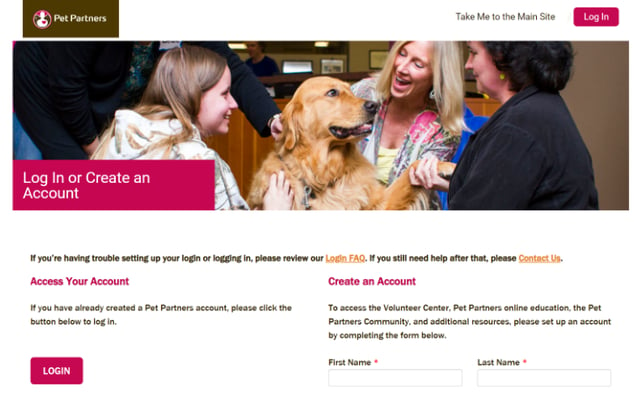

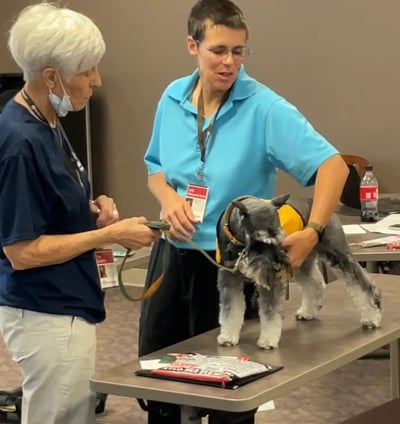

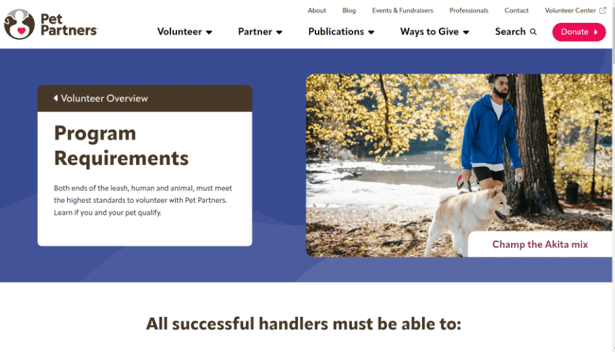

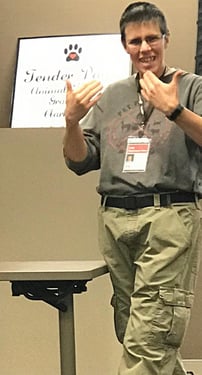

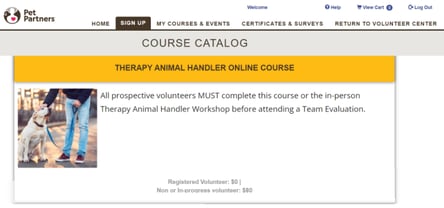

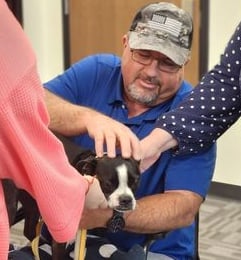

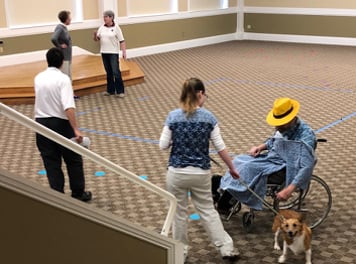

7. Being a Registered Therapy Team
After receiving your letter of confirmation from Pet Partners, you are ready to begin visiting. Your badge and your Therapy Animal's tag will arrive in several weeks. These must be worn when visiting; they identify you and your partner as a Registered Therapy Animal Team and are "on the job." It's a requirement in order to be insured during your visits.
Remember "YAYABA" (You Are Your Animal's Best Advocate). Make sure your animal is feeling well and happy about visiting. Read your animal's body language and know if they are telling you they want to end a visit.
Finally, Therapy Animals have no special status allowing them to be taken into stores, offices, or other businesses. Therapy Animals are not Service Animals (unless your Therapy Animal is ALSO a Service Animal).




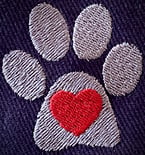

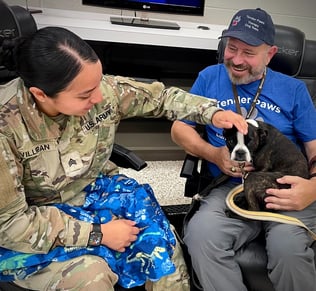

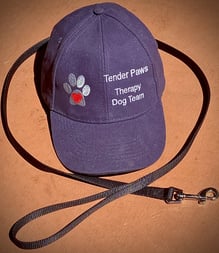

Preparing Your Puppy to be a Therapy Dog
I just got a puppy and we want to become a therapy animal team. Where do I start?
At Tender Paws, this is a question we hear all the time. We’ve put together a few suggestions for aspiring therapy dog teams that are grounded in Pet Partners' philosophy of YAYABA™ or You Are Your Animal’s Best Advocate.
Begin Socialization: Puppies need a variety of experiences from car rides to visiting with all kinds of people, to going to as many settings as you can imagine. Take your puppy to places such as a public park, a garden center, or a pet store. Allow them to meet people of different ages and ethnicities as well as individuals wearing uniforms, hats, and glasses. Each new experience should be pleasant and positive. As you are exposing your puppy to new people and places, be prepared and expect the unexpected because one negative experience can have a life-long impact on a dog. Don’t overdo socialization. It’s better to have short, but frequent, positive experiences.
Consistent Handling: Therapy animals need to be at ease with physical contact. When they are young, start by touching their body everywhere including feet, ears, tail, and mouth. Begin with a soft and gentle touch and work up to slightly clumsy petting, but never a painful, touch. Also, take time every day to establish comfort with grooming. Brush hair and teeth and touch, clip, or file your pup’s nails. Decide if you will be the person to give your dog a bath or if you will have a professional groomer do these tasks. If you plan to use a groomer, be sure and introduce your puppy to the groomer and equipment at an early age.
Develop a Trusting Relationship: Like any friendship, you must experience different things together and discover what makes both of you happy. For experiences that are less desirable for your animal, take steps to improve the situation or shorten its duration. As a therapy animal team, your animal will count on you to advocate for them while visiting. By taking that role seriously for your puppy, they will come to trust that you consistently make decisions in their best interest. This trust is the cornerstone of the teamwork needed for every successful therapy animal team. Start Training This is something you can work on individually or with a trainer. Consider the methodology the training center and trainer uses when you select a program. The Association for Professional Dog Trainers is a great source of information. Tender Paws and Pet Partners advocates for positive reinforcement and force-free methods for training because it contributes to the trusting relationship you are building.
Don’t neglect your own training: Learning to read your animal’s body language is critical for a therapy animal handler. The canine body language course on the Pet Partners National website is a great place to start. Check out Canine Body Language Course
Find a Veterinarian: A successful relationship with your veterinarian is built on mutual trust, respect, and communication. Look for someone with a similar approach to pet care as you who will be open to questions and who values your observations about your animal.
Determine Aptitude and Interest: Successful therapy animals enjoy spending time not just with their owner or family, but with people they haven’t met previously. They enjoy providing comfort to others and seek out interactions. It is your responsibility to ensure that your animal truly enjoys – not just tolerates – Therapy Animal interactions. A dog with strong obedience skills may be able to perform some Therapy Animal tasks, however, if they are enduring the interactions because they feel they must follow your direction, that may ultimately erode the trusting relationship with your animal. It is up to every pet owner to be their animal’s advocate and make choices in their animal’s best interests – including whether therapy work is the right choice.
Trainers: Tender Paws and Pet Partners are advocates for positive reinforcement and force-free methods of training. It contributes to the trusting relationship you are building with your pet. If you do choose to use a professional trainer for your pet, you need to consider the methodology used.
Please note that using a professional trainer does not guarantee a passing Pet Partner evaluation score.
Info Request Form
Thank you for your interest in becoming a Tender Paws Volunteer or a Therapy Animal Handler. Please fill out the form below. Someone will reply to you shortly.
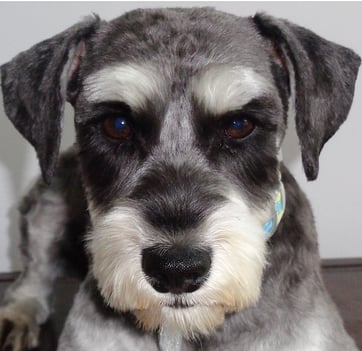

Tender Paws
250 Wilma Rudolph Blvd.
Suite F, Box 188
Clarksville, TN 37040
Email: Info@TenderPawsClarksville.org
